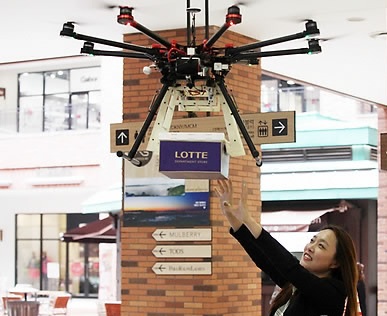- California Assembly OKs highest minimum wage in nation
- S. Korea unveils first graphic cigarette warnings
- US joins with South Korea, Japan in bid to deter North Korea
- LPGA golfer Chun In-gee finally back in action
- S. Korea won’t be top seed in final World Cup qualification round
- US men’s soccer misses 2nd straight Olympics
- US back on track in qualifying with 4-0 win over Guatemala
- High-intensity workout injuries spawn cottage industry
- CDC expands range of Zika mosquitoes into parts of Northeast
- Who knew? ‘The Walking Dead’ is helping families connect
S. Korea to commercialize drone delivery service by 2020
By Choi Sung-jin
As early as 2020, South Korea will be able to commercialize delivery services using drones, government officials said.
The Ministry of Land, Transport and Infrastructure said Tuesday that central and local governments, with the private sector, will conduct pilot projects in eight areas, including transporting goods, to revitalize the industrial use of unmanned flying vehicles.
Ministry officials also unveiled measures to support the drone industry by, for instance, relaxing regulations on the weight of drones for hobby use and reducing no-fly zones.
“This may sound a bit too ambitious but the government is pushing to make home delivery by drones routine,” said Chang Yeo-jin, an official at the ministry’s Flight Policy Division. “We hope to develop a business model from which both businesses and consumers can benefit.”
The government has a two-phase plan. By 2017, it would undergo a “point-to-point” stage, during which they will conduct experiments by having drones carry packages weighing less than 5 kilograms within a radius of 5 kilometers. From 2018, it will move into the second “door-to-door” stage, making drones carry goods to consumers’ homes.
But the ministry still has a long way to go. For instance, this involves enhancing safety to prevent falls, improving batteries for longer flights and developing software for navigation and other operations. Most urgent is to extend the flight distance from the present 5-6 km, which will require not just technological upgrading but security discussions with the defense ministry.
Six businesses, universities and other institutions are taking part in the drone project using locally made “multi-copter” drones, with some planning to use foreign drones, too, the officials said.
Amazon, the front-runner in this area, recently unveiled its “prime air” service that can deliver goods to customers within 30 minutes of their order. Amazon’s drones can fly 16 km or more and carry up to 2.26 kg.















![넷플릭스 2025년 라인업 공개 [넷플릭스 제공. 재판매 및 DB 금지]](http://www.koreatimesus.com/wp-content/uploads/2025/04/20250415135202671-copy-120x134.jpg)
